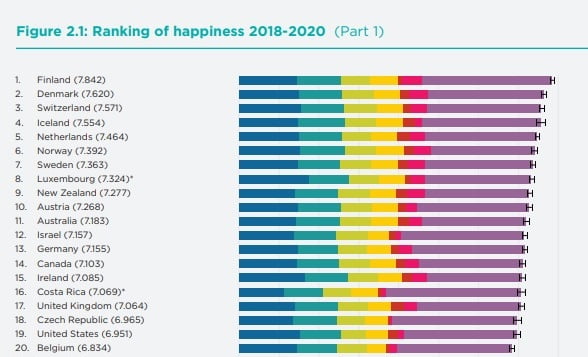Israel climbed to the 12th rank in the latest annual United Nations World Happiness Report for 2021, up two spots from the 2020 survey released last year just as the coronavirus pandemic was gaining speed across the world.
The country ranked 13th in the 2019 World Happiness Report and 11th in 2018, a rank it held consecutively for five years previously. It improved its position in the annual survey in 2021 amid a world-leading COVID-19 vaccination campaign that has seen over half of Israel’s population fully inoculated so far and despite three nationwide coronavirus lockdown and an upcoming national election this week, its fourth in two years.
The World Happiness Report, produced by the UN Sustainable Development Solutions Network (SDSN), ranks countries by how happy their citizens perceive themselves to be according to six key variables: GDP per capita, social support, healthy life expectancy, freedom to make life choices, generosity, and freedom from corruption.

This year, 149 countries were ranked in the report though surveys in 2020 were conducted in fewer than 100 countries due to the pandemic. Index ranking for the other countries were based on estimates using past data.
Rankings were based on Gallup World Poll surveys from 2018 to 2020 and on answers to the main life evaluation question asked in the poll (the Cantril ladder asks respondents to rate their own current lives on a scale of 0 to 10, with the best possible life for them being a 10, and the worst possible life being a 0). The typical annual sample for each country is 1,000 people. If a country had surveys for each year, the sample size would become 3,000 people.
Researchers then measure the results against the six variables.
The results had European countries dominating the top 10 spots in 2021, with New Zealand mixed in. The top 10 were Finland, Denmark, Switzerland, Iceland, the Netherlands, Norway, Sweden, Luxembourg, New Zealand, and Austria.
It was Finland’s fourth consecutive year in first place in the annual report. The US, slipped from 18th place last year, to 19th place in 2021. On a shortened ranking of countries surveyed by the UN, the US placed 14th and Israel placed 11th.
This year’s World Happiness Report naturally focused on the effects of COVID-19 on happiness and how countries have fared in handling the pandemic and maintaining connected and healthy societies. The report’s eight chapters address different aspects of the global crisis such as mental health, social connections, and the future of work. One section was dedicated to the countries and regions – namely East Asia, Australia, and New Zealand – that handled the pandemic exceptionally well.
“We need urgently to learn from COVID-19,” said Columbia University economist Jeffrey Sachs, a co-author of the World Happiness Report. “The pandemic reminds us of our global environmental threats, the urgent need to cooperate, and the difficulties of achieving cooperation in each country and globally.”
“The World Happiness Report 2021 reminds us that we must aim for wellbeing rather than mere wealth, which will be fleeting indeed if we don’t do a much better job of addressing the challenges of sustainable development,” said Sachs, also the director of SDSN and the Earth Institute’s Center on Sustainable Development.
Sign up for our free weekly newsletter
SubscribeThe global COVID-19 pandemic has killed close to 3 million people worldwide since the novel coronavirus was first detected in the Chinese city of Wuhan in December 2019. China imposed a strict lockdown in affected areas. Other countries in the region quickly followed suit.
SEE ALSO: Israel In Numbers: Snapshot Of A (Largely) Happy, Healthy, Educated Nation
“The East Asian experience shows that stringent government policies not only control COVID-19 effectively, but also buffer the negative impact of daily infections on people’s happiness,” said Shun Wang, a professor at South Korea’s KDI School of Public Policy and Management, and a co -author of the report. “You can find this kind of expressions from the conclusion of our chapter and the summary in the Chapter 1.”
Overall, however, the rankings remained similar to last year, the report’s editors noted.
“Surprisingly there was not, on average, a decline in well-being when measured by people’s own evaluation of their lives,” said John Helliwell of the Vancouver School of Economics at the University of British Columbia, also a co-author of the report. “One possible explanation is that people see COVID-19 as a common, outside threat affecting everybody and that this has generated a greater sense of solidarity and fellow-feeling.”
“This has been a very challenging year, but the early data also show some notable signs of resilience in feelings of social connection and life evaluations,” said Lara Aknin, an associate professor at Simon Fraser University in British Columbia.
The bottom three countries where citizens felt least happy according to the World Happiness Report were Rwanda, Zimbabwe, and Afghanistan.
The UN’s World Happiness Report has been released yearly since 2012, following a resolution proposed by Bhutan and passed by the UN General Assembly in June 2011 that invited national governments to “give more importance to happiness and well-being in determining how to achieve and measure social and economic development.”
Bhutan, a landlocked Buddhist kingdom in the eastern Himalayas famously measures gross national happiness (GNH) for its population of fewer than a million people. The country was not included in the 2021 World Happiness Report, published every year on the International Day of Happiness marked on March 20th, because of the absence of Gallup surveys in recent years.
Related posts

Editors’ & Readers’ Choice: 10 Favorite NoCamels Articles

Forward Facing: What Does The Future Hold For Israeli High-Tech?

Impact Innovation: Israeli Startups That Could Shape Our Future




Facebook comments